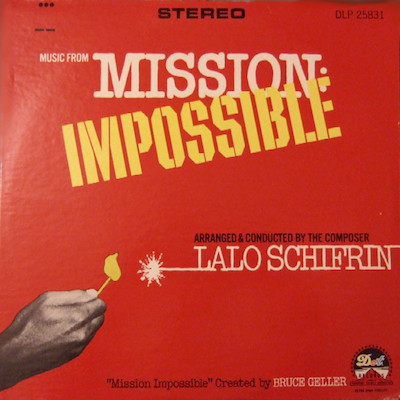Themes and motifs tend to come and go with reboots and reimaginings, no matter how famous they are—just look at “Star Trek,” where Alexander Courage’s theme and fanfare was relegated to a few cameos and an end title reprisal, or even “The A-Team,” which found Mike Post and Pete Carpenter’s classic credit sequence call to arms reduced to a couple of brief references. Try to get away with that kind of behaviour on another of Paramount’s tentpole franchises, the “Mission: Impossible” series, and you’ll be thrown out faster than a “You’re Fired” message can self-destruct.
Lalo Schifrin’s super-effective theme—composed in off-kilter 5/4 time—has become an integral part of the “Mission: Impossible” brand to the point where even the trailers have a celebratory appearance. For Brian De Palma’s 1996 big screen version, U2 pair Adam Clayton and Larry Mullen put together an electronic version that was released as a single to promote the film, but it was Danny Elfman’s dynamite main title that really energised the franchise on celluloid (although you can hear original composer Alan Silvestri’s interpretation on the original teaser). For the ’96 picture, De Palma and Elfman started a tradition for the series’ title sequences that has seen them become more and more elaborate, although ironically that powerful montage was a definite homage to the quick-cut titles of the TV series, its rhythm once again dictated by Schifrin’s machine gun riff, a faster-paced successor to Henry Mancini’s “Peter Gunn” theme from 1958. Perhaps you’d expect Elfman’s to be a little jauntier but it’s absolutely thrilling, full of intrigue and a dynamic use of brass, especially in the finale cue with Tom Cruise’s character Ethan Hunt riding a helicopter through the channel tunnel.
With De Palma’s cracking thriller making over $450 million in American theaters, the inevitable sequel “Mission: Impossible II” was helmed by John Woo and scored by Hans Zimmer, who brought along his “Gladiator” collaborator Lisa Gerrard. Here, the tone was set by the trailer and the ancillary marketing, with a long-haired Ethan Hunt jumping around to a heavy metal rendition of the Schifrin theme, with singles from the soundtrack coming from Limp Bizkit and metal legends Metallica. Zimmer’s score often feels like it suffers from close proximity to its Roman brother, but it kicks into life during the breathtakingly ridiculous final act, guitars crunching and wailing but still Schifrin-ing to the bitter end.
2006’s “Mission: Impossible III” saw J.J. Abrams making his directorial debut, and as such bringing across his composer from “Alias” and “Lost,” Michael Giacchino. While opening the film traditionally with the theme (and easily the most boring title sequence of the series) Giacchino brought some variation by having the first few bars of the theme’s rhythm played solely on percussion before continuing the piece traditionally, and continued to play around with hints of the theme, opting to instead use Schifrin’s B-theme from the TV show, “The Plot.” When he does bring the main theme in, such as during the Vatican operation, it’s as traditional as can be, which proves where Giacchino’s heart really lies. It’s a shot in the arm for the film with the audience, and the end title version is just as thrilling.
Giacchino returned in the third sequel “Ghost Protocol” in 2011 with an even more spectacular score, beginning with a suitably subtle and sneaky mood for the prison-escape opening title sequence before exploding with the theme as the camera splits from the actors and follows the lit fuse—another bit of iconography from the original show. Giacchino is in much more jazzy form here, the intervals wonderfully played on woodwinds next to the brass blasts of the main riff. It’s just marvellous, even when he finds time to extend the piece with his own thematic noodling. With Tom Cruise’s stunts basically defining these movies, it’s not surprising that the high-rise stunt at the Burj Khalifa where he has to run around the side of the building and then swing into an open window has Schifrin’s theme blaring at the crucial moment; we know he can do it because we hear the theme.
Joe Kraemer came onboard for the fifth film, with 2015’s “Mission: Impossible – Rogue Nation” benefitting from Christopher McQuarrie’s direction and previous relationship with Kraemer on movies like “The Way of the Gun” and “Jack Reacher.” Kraemer started on fire with a great tease of the theme over the opening logos and then doing the same during Cruise’s big pre-credit stunt where he hangs onto the side of a plane, but it’s the end of that sequence where he brings out the crowdpleaser, with the opening reverberation firing as Hunt pulls the cord and disappears out of the plane, the theme exploding as the credits begin in what is a clear homage to the De Palma television-esque titles. Kraemer’s voicing of the theme is aggressive and harsh, perhaps more suitable for McQuarrie’s film but not as self-parodying as Zimmer’s, and his use of “The Plot” as a secondary motif is satisfyingly tense, not to mention the interpolation of Puccini’s “Turandot.” It’s thrilling when he uses broad strokes of the theme during the high-octane bike chase, knowing the constant modulation of the motorcycle engines is the key sound in that particular scene, but it’s the thundering percussion and jagged brass lines in the “curtain call” at the end of the film that really underlines just how good Kraemer is with Schifrin’s theme.
So far, Lorne Balfe’s treatment of Schifrin has shown a brand-new addition: the use of choir. I cannot confirm or deny how effective it is in the film as I haven’t seen it yet. But it’s undeniably cool that Schifrin’s theme is still going strong and has had such a huge cultural influence to the point where it’s probably neck and neck with Norman/Barry’s famous theme for another super-spy, James Bond.











